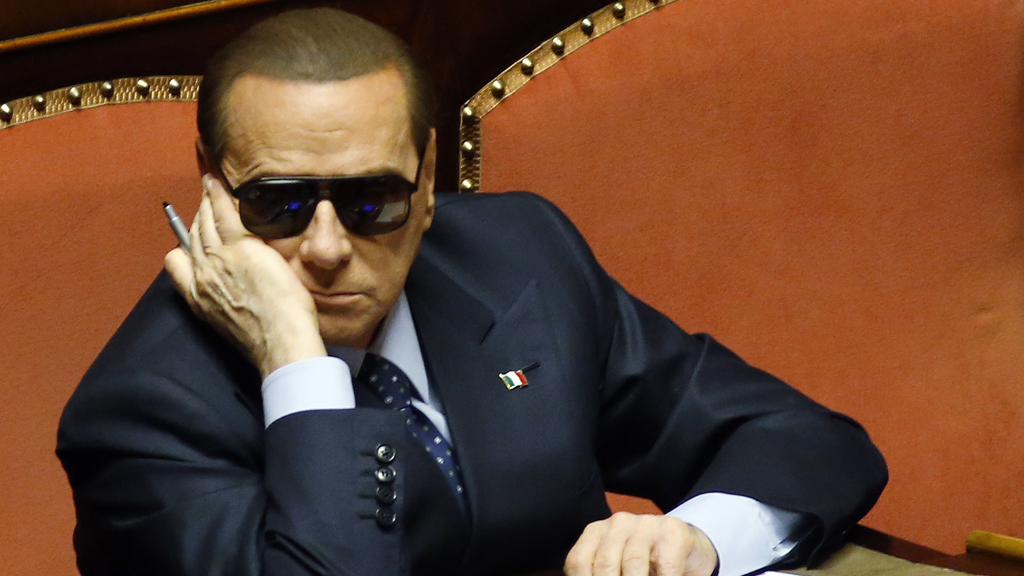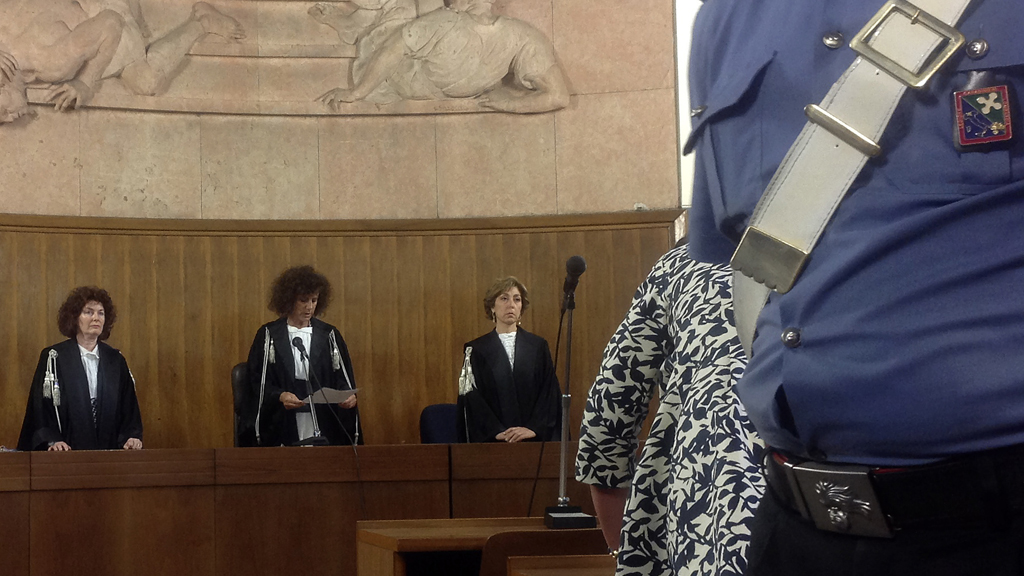How does Silvio Berlusconi stay out of prison ?
The ex-Italian premier has been sentenced to more than 17 years of jail time over the decades. But the slow arm of Italian law means Silvio Berlusconi is unlikely to see the inside of a cell.

The 76-year-old has been sentenced to seven years for paying an under-age prostitute for sex and trying to get public officials to cover up the scandal.
But former cabinet minister Maurizio Gasparri spoke for many Berlusconi supporters when he said: “Thank God, there are two more levels of appeal. Therefore this verdict will not cause any consequences.”
Experts say Italy‘s legal system is slow, vulnerable to political influence and reluctant to jail people for less serious offences.
That means Berlusconi could escape jail again, despite being found guilty of paying Moroccan nightclub dancer Karima El Mahroug for sex at his infamous “bunga bunga” parties when she was just 17.

A panel of three female magistrates also found that he abused his powers by calling police who had arrested Ms El Mahroug and told them she was a relatove the then Egyptian president Hosni Mubarak.
The judges went further than the six-year term prosecutors had asked for, passing a seven-year sentence and banning Berlusconi from holding public office for life.
They issued an incredible verdict of violence never seen or heard before, to try to eliminate me from the political life of this country. Silvio Berlusconi
An unrepentant Berlusconi took to Facebook to protest his innocence on Tuesday, saying: “I was really convinced they would acquit me as the evidence was such that there was no possibility to convict me.
“Instead, they issued an incredible verdict of violence never seen or heard before, to try to eliminate me from the political life of this country.”
Courting disaster
The trial is the latest in a long line of brushes with the law for the media tycoon and three-time prime minister, who has been involved in at least 20 trials over the years. He claims much of the judicial interest in his affairs is politically motivated.
Berlusconi was convicted of perjury in 1990 after lying about his membership of the infamous Propaganda Due (P2) masonic lodge. But the court did not sentence him as an amnesty was in operation.
He has also been convicted of bribery, illegally financing a political party, and false accounting, only to have appeal courts give him the benefit of the doubt with "not proven" verdicts or rule that the sentence could not go ahead because time limits expired before the appeal had been completed.
This so-called "statute of limitation" rule has also seen Berlusconi acquitted of bribing a judge and making secret payments to football players.
In 2002 false accounting charges were abandoned after the Berlusconi government changed the law to decriminalise some accounting practices. He has also twice passed laws guaranteeing immunity from prosecution for top politicians.
Berlusconi has been cleared of wrongdoing by courts in relation to other allegations including collusion with the Mafia and tax fraud.
Sex appeal
Berlusconi’s lawyers immediately announced their intention of appealing against the “bunga bunga” verdict. He is also appealing against a four-year sentence handed down last year for tax fraud involving the jewel in his media empire, Italy’s biggest commercial broadcaster Mediaset.
The conviction was upheld by the court of appeal in Milan last month and there is one appeal stage left. But as ever, the clock is running down.
And even if a jail sentence is upheld, Italian courts are under pressure to avoid swelling overcrowded prisons by enforcing custody for less serious crimes.
One sentencing guideline, supported by Berlusconi, encourages courts to order the house arrest of criminals over 70 rather than send them to jail.
In Italy, nobody goes to jail unless they have committed very serious crimes. Nobody goes to jail for not paying taxes – forget about it. Dr Riccardo Montana
Dr Riccardo Montana, an expert on Italian law from City University London, said it is not just wealth and power that count in Berlusconi’s favour. The extreme length of Italian criminal trials and a certain tendency to leniency are among the factors that have kept him out of jail so far.
He said: “The average Italian person won’t have all the opportunities that Berlusconi has – the more you can pay your lawyers, the better.
“But the same principle applies: it’s going to take forever. You are going to be involved in this process for many years.
“Because it takes so long there are a number of legal rules around statutes of limitation. And it is relatively easy to go through all the appeals and go to the supreme court.”
He added: “In Italy, nobody goes to jail unless they have committed very serious crimes. Nobody goes to jail for not paying taxes – forget about it.”
Dr Stefano Maffei, a law lecturer at the University of Parma, said: “In England the presumption of innocence ends when the jury returns a guilty verdict, but in Italy the presumption of innocence does not end at the end of the trial.
“In order to be detained you need either a preliminary detention order or a final judgement.
“So far Mr Berlusconi has not been finally judged, and they (prosecutors) have not asked for him to be detained.
“Berlusconi fans say that is because they are not convinced of his guilt. People who are against him would say it is because in the case of a politician, you need to go to parliament for a detention order, and traditionally parliament has been reluctant to grant them.
“The wider point is that Italy is a lenient country. We only have 60,000 people in custody in total. England has four times the ratio in terms of population.”
Berlusconi’s women

Karima El Mahroug
Now 20, the Moroccan dancer is better known to the Italian public as Ruby Rubacuori (Ruby Heart-stealer).
Her evidence about parties allegedly held at Berlusconi’s villa led to the popularity of the term “bunga bunga” – though the precise meaning of the words remains a matter of debate.
She has testified that the parties featured young women dressed as nuns, nurses, and, bizarrely, US President Barack Obama.
She said she received envelopes full of cash from the then-prime minister but has always denied they had a sexual relationship, saying the 76-year-old treated her “like a father”.

Veronica Lario
In one of five outstanding court cases Berlusconi faces, his ex-wife is pursuing him through the civil courts over a 3m euro-a-month divorce settlement.
The former actress sought a separation after a series of revelations about her husband’s friendships with young women.
She said she could no longer tolerate a system in which “virgins are offered to the dragon”.

Ilda Boccassini
The flame-haired prosecutor, known as Ilda the Red, has clashed with Berlusconi repeatedly over the years before securing his conviction in the Ruby case.
She reportedly received anonymous death threats and was even sent bullets in the post during the case.
Ms Boccassini, a veteran of the fight against organised crime in Sicily and Calabria, is no stranger to intimidation. She was a close friend of Giovanni Falcone, the anti-Mafia judge blown up by Cosa Nostra in 1992.
A wiretap recorded a suspected member of an ‘Ndrangheta crime family referring to her reverentially as “a tiger”.